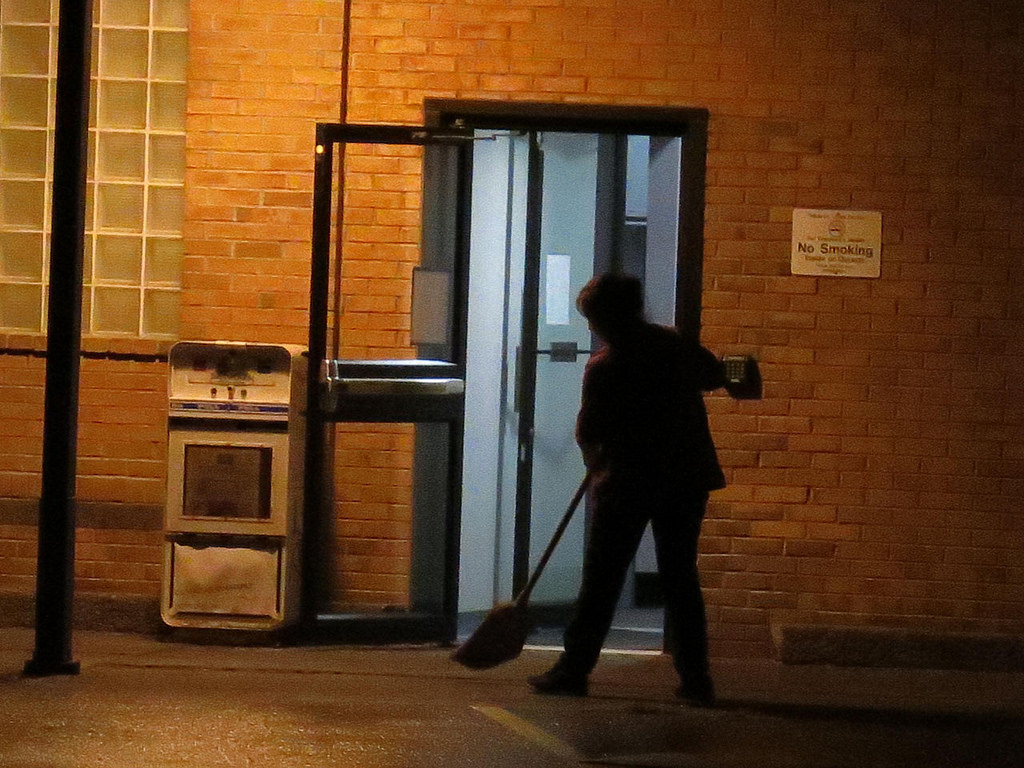When you’re working a low-wage job, life is about choices.
Lyne Giard works as a cleaner in a water purification plant in Ottawa. She is a shop steward for her union, SEIU Local 2, and because she makes $13.50 an hour, she says she is one of the lucky ones.
“Cleaning has always been a lower paid job, and people work very hard, physically,” said Giard. “You work hard all day and in order to make things happen financially, most people have to work two jobs or even three jobs. Emotionally, physically it’s overwhelming.”
“If you work two or three jobs you aren’t home for your kids, and you end up giving less to your family.”
A lot of other federally contracted cleaners work for minimum wage, which in Ontario is currently $11 an hour. And like Giard, they make sacrifices.
“There’s lots of struggling, juggling bills, you pay one bill one month and not the other,” said Giard, “You cut down on activities, you make different choices at the grocery store, lots of pasta and rice. My daughter used to go to martial art class, but I can’t afford that on my salary.”
After working 14 hours a day for a year, Giard can confirm that life is not easy when you’re bumping along the poverty line, which is why, on Saturday June 20th, Giard will be the first on the speakers list for the official launch of the Invisible No More campaign at Ottawa’s city hall.
Initiated by SEIU Local 2, in collaboration with ACORN Canada, the campaign will draw attention to the struggle and mistreatment of both unionized and non-unionized janitors and cleaning staff.
Approximately 3,000 people are employed as janitors, maintenance workers, and cleaners in Ottawa, the majority of them are women and recent immigrants. While most of these workers clean federal government buildings they are employed indirectly through private companies who bid for government cleaning contracts.
Since workers are employed indirectly through contract cleaning firms, these are the employers that SEIU bargains with. Roughly 13 cleaning companies will participate in a bargaining process that will ultimately produce a ‘master contract’ for all unionized cleaners.
Negotiations have recently begun but SEIU organizer Diego Mendez says that conditions will not improve in the sector unless changes are made by the federal government, who indirectly hires the cleaners.
“We can’t bargain with the federal government, we can only bargain with the employers, and those are the cleaning companies,”Mendez explained, “So we know that we need to move the property owners, and in this case the biggest single property owner is the government in Ottawa, and so we need a campaign to do that because we can’t bargain with them directly.”
While contracting out helps the government cut down on costs, it creates dismal working conditions for the workers hired under those contracts.
The Janitorial Services National Strategy, which outlines the government’s current subcontracting policy, stipulates that contracts should be awarded to the lowest-price qualified bidders. This practice puts an incentive on contractors to keep labour costs as low as possible, creating downward pressure on workplace standards and wages.
Currently, the government policy does not exclude labour law violators from winning contracts, and contractors have found creative ways of getting around the Employment Standards Act, such as hiring workers as independent ‘subcontractors,’ which exempts them from health and safety coverage, employment insurance, Canada Pension Plan contributions, and often even minimum wage.
The SEIU says that the government could dramatically improve working conditions by adopting a living wage policy which would make $15 an hour plus medical benefits the standard for government contractors and including responsible contracting clauses that would force the government to take into account the wages and treatment of workers when awarded cleaning contracts.
The NDP has promised to adopt these amendments if voted into government in the upcoming election. Liberal party did not return calls before this article was published.
While the SEIU is hoping to win living wages and benefits for workers in their current round of contract negotiations, Mendez says that changing the government policy would broaden the scope of these improvements.
“This kind of policy would help our members but also cleaners who may not be our members, as well as other workers in federal buildings that are contracted – so maybe security or food service workers – who are not our members,” said Mendez. “Why not create a campaign that is going to help a larger sector of the workforce?”
“Often groups that are opposed to living wages will say that it’s a burden on taxpayers,” said Mendez. “Studies show that that’s not true. You start paying a living wage, you get more productive workers and you save money that way. You don’t actually spend a lot of extra money.”
“$15 dollars an hour would definitely relieve pressure for these families,” said Giard. “When you work with a minimum wage salary, it’s a vicious cycle; in order to live better you have to work more, and if you work more you can’t take courses at school to improve your education and get a better job. By keeping employees at such a low salary, it keeps them from having a better life.”
“If most people knew the level of physical work and financial struggle that everybody was going through, people would be a lot more concerned,” said Girard. “We are not ghosts.”
Hence the campaign’s slogan: invisible no more.
Ella Bedard is rabble.ca’s labour intern and an associate editor at GUTS Canadian Feminist Magazine. She has written about labour issues for Dominion.ca and the Halifax Media Co-op and is the co-producer of the radio documentary The Amelie: Canadian Refugee Policy and the Story of the 1987 Boat People.



